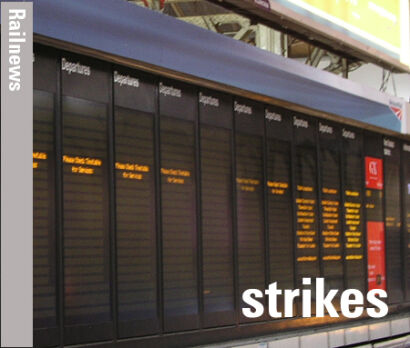Members of ASLEF at most train operators in England have started a week-long overtime ban today, and a series of one-day strikes is set to begin tomorrow at Govia Thameslink Railway, Southeastern and South Western Railway.
Northern and TransPennine Express will be affected on Wednesday, c2c, Greater Anglia and LNER on Friday, and Avanti West Coast, East Midlands Railway and West Midlands Railway on Saturday.
There will be no walkouts on Sunday, but a final round of 24-hour strikes will be staged by ASLEF drivers at Chiltern Railways, CrossCountry and GWR on Monday, while the overtime ban will also run until Monday.
ASLEF had planned a further five days of strikes on LNER from next Monday until Friday, but has called them off. These walkouts were suspended after it emerged that LNER would not be using the new and controversial minimum service law, which could have required at least 40 per cent of drivers to book on for duty, at the risk of heavy penalties for the union if they did not.
The union has not confirmed that this was the reason, but some politicians are critical of what they see as state-owned LNER’s ‘failure’ to enforce the new law. Former Conservative leader Sir Iain Duncan Smith has maintained that LNER managers had shown ‘rank cowardice’, telling the Daily Mail that ‘if the law is there you use it’.
A spokesman for the Prime Minister said the decision to go ahead with the rolling strikes was ‘extremely disappointing’, continuing: ‘ASLEF drivers continue to be paid far above what the average person in the UK receives. Rail companies have made a fair and reasonable offer, and we would encourage them to step back from this action.’
ASLEF general secretary Mick Whelan said: ’We have given the Government every opportunity to come to the table but it has now been a year since we had any contact from the Department for Transport.
‘It's clear they do not want to resolve this dispute.
‘Many of our members have not had a single penny increase to their pay for half a decade, during which time inflation has soared and, with it, the cost of living.
‘Train drivers didn't even ask for an increase during the Covid-19 pandemic when we worked throughout lockdown as key workers, risking our lives, to move goods around the country and to enable NHS and other workers to get to work.
‘The Tory government has now tried its old trick of changing the rules. When they couldn't win they brought in minimum service levels legislation.
‘But this new law, as we told officials during the consultation period, won't ease industrial strife. It will just make it worse.
’There is, frankly, no excuse for this nonsense. The Government and train operating companies should come to the table with a realistic offer so we can end this dispute and work together to ensure the future of our railways.’
Merseyrail is not involved in the dispute, and neither are the domestic operators in Scotland and Wales. Trains should run normally there, except that some cross-border services run by English operators could be disrupted, particularly on Friday, Saturday and Monday.


